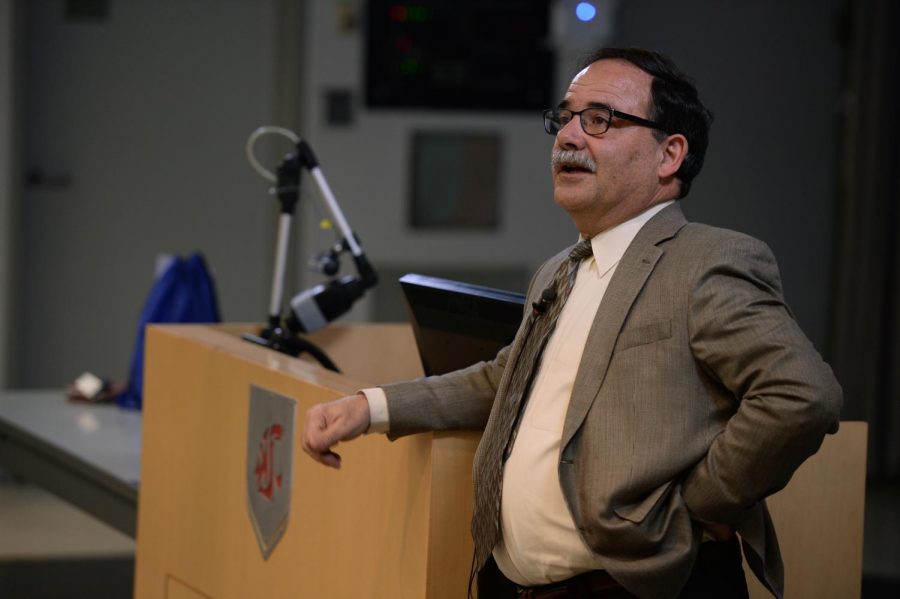Bernardo calls faculty balance a priority
Provost said tenured faculty needs to increase, WSU committed to arts
ABBY LINNENKOHL | The Daily Evergreen
Provost Dan Bernardo answers faculty questions regarding athletics, Performing Arts and tenure versus non-tenure track staff, Thursday during the final Faculty Senate meeting of the semester.
April 12, 2018
Provost Dan Bernardo identified the proportion of tenured to non-tenured faculty as the most important issue for achieving the “Drive to 25” during a presentation to the Faculty Senate at its last meeting of the school year.
Bernardo pointed to fixing this imbalance as the highest priority for WSU’s plans to become a top-25 research institution by 2030.
“I think [faculty composition] is an issue that we do all need to be worried about,” Bernardo said.
He said across the country, tenure-track faculty have decreased from about 45 percent of all faculty to about 25 percent since 1975.
In the past 10 years, he said, the total faculty members at WSU has increased from about 1,550 to about 1,900. The number of tenure-track faculty, however, has decreased by about 5 percent, Bernardo said.
He said the gist of the matter is that the increase comes from non-tenure track faculty. The factors driving this change over the past decade, he said, include enrollment increases, enrollment-based budgeting and the need to rapidly increase teaching faculty. He said there has been a reduction in tenured or tenure-track faculty at all WSU campuses.
Among 21 peer universities, Bernardo said, WSU is the fourth lowest in tenure and tenure-track faculty.
“This is a concern to all of us,” he said.
Bernardo also discussed the strategies WSU has outlined for rebalancing the faculty proportions. He said they must first increase the number of tenure-track faculty.
Electrical Engineering and Computer Science Senator Ben Belzer brought up concerns that WSU spends more on administration than its peers, according to the American Council of Trustees and Alumni.
Bernardo said if that number is based on Pullman data, then it is problematic due to the system-wide administration that the Pullman campus has. He said when looking at the amount WSU spends on administrative personnel, it is difficult to believe it spends disproportionately on administration.
“We need to make sure we’re comparing apples to apples,” he said.
Belzer said this is something WSU needs to look into, due to the university’s budgetary constraints.
College of Arts and Sciences Senator Mary Trotter, whose faculty position is slated to be eliminated as a result of university-wide spending cuts, asked Bernardo for a justification of how the university can make cuts to academic units while giving million-dollar raises to athletic coaches.
WSU’s administration announced this year that the Performing Arts program, which Trotter advises, will be cut to help the university curb a $30-million deficit, while Head Football Coach Mike Leach received a contract extension that guarantees him $4 million in 2020.
“We are in a highly competitive athletic conference,” Bernardo said, noting that athletics is valuable to students and alumni. “Coaching salaries are ridiculous, I think we all can agree on that … I do not believe in all this stuff around ball game wins make increase in enrollment and all that, but I can tell you it really helps our visibility and our reputation.”
He said WSU President Kirk Schulz had to make a tough choice, adding that the university has made progress towards balancing its budget.
“That’s the cost of being involved in intercollegiate athletics,” he said.
Trotter asked him what he thought the value of arts is at WSU, and he responded by pointing out that the university just invested in a new museum of art.
Trotter noted there are other types of art on campus as well, and Bernardo said a consortium of faculty is currently trying to develop a proposal on how to invest in and perpetuate the arts. He said WSU needs the arts, as they are part of the transformational student experience.
Bernardo said his top priority when looking at spending cuts is to protect the undergraduate students at WSU and their ability to graduate.
“From where I sit,” he said, “that is the number one criteria as I look at these decisions.”









